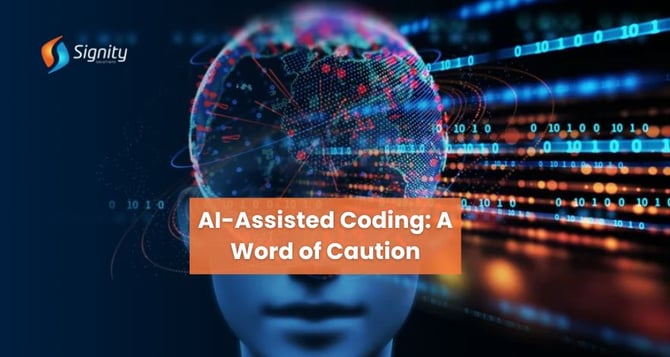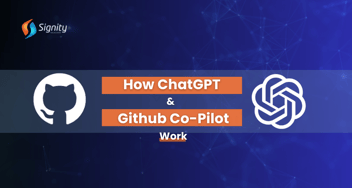AI-Assisted Coding: A Word of Caution
Explore the promises and potential pitfalls of AI-assisted coding. This technology empowers developers with increased productivity and code quality while navigating challenges such as bias and security concerns.

Introduction: Unveiling the Potential of AI-Assisted Coding
As Artificial Intelligence (AI) continues to make significant strides in various industries, one area that has seen considerable attention is AI-assisted coding. These tools promise to revolutionize software development by automating repetitive tasks, suggesting optimizations, and accelerating the coding process.
While AI-assisted coding tools offer undeniable benefits, there are also important considerations and potential pitfalls that developers should be aware of.
In this article, we'll explore the promises and pitfalls of AI-assisted coding, along with a word of caution for developers, accompanied by a technical implementation example.
The Promise of AI-Assisted Coding
AI-assisted coding tools offer several compelling advantages for developers:
-
Increased Productivity: AI-powered code suggestions and auto-completion features can significantly speed up the coding process, allowing developers to write code more efficiently.
-
Code Quality Improvements: AI algorithms can analyze code patterns, identify potential bugs or vulnerabilities, and suggest optimizations, leading to higher-quality code and fewer errors.
-
Learning and Skill Enhancement: AI-assisted coding tools can serve as valuable learning aids for developers, providing insights, best practices, and suggestions for improvement based on established coding standards and community norms.
-
Code Consistency: AI can help ensure consistency in coding style and practices across projects and development teams, reducing maintenance overhead and enhancing code readability.
Unlock the Potential of AI-Assisted Coding
Dive into our AI solutions tailored for developers, leveraging ChatGPT technologies for enhanced productivity and code quality.
Potential Pitfalls and Cautionary Considerations
Despite the promises of AI-assisted coding, there are several potential pitfalls and considerations that developers should be mindful of:
-
Overreliance on Automation: Relying too heavily on AI-assisted coding tools can lead to complacency and a lack of critical thinking. Developers may become dependent on auto-generated code without fully understanding its implications or underlying principles.
-
Black Box Nature of AI: AI algorithms used in coding tools are often opaque and difficult to interpret. Developers may struggle to understand why certain suggestions or recommendations are made, leading to potential misunderstandings or errors.
-
Bias and Limitations: AI models trained on biased or incomplete data may produce biased or inaccurate code suggestions. Developers should be cautious of inherent biases in AI-assisted coding tools and critically evaluate their recommendations.
-
Security and Privacy Concerns: AI-assisted coding tools may inadvertently introduce security vulnerabilities or privacy risks into the codebase. Developers should exercise caution when using AI-generated code and conduct thorough security assessments and code reviews.
Our Role: Delivering Advanced AI-Assisted Coding Solutions
As Artificial Intelligence (AI) continues to revolutionize industries, AI-assisted coding emerges as a significant advancement of AI in software development. While promising increased productivity, improved code quality, and learning opportunities, developers must navigate potential pitfalls. Signity Solutions, a leading generative AI development company, empowers developers with cutting-edge AI technologies developed by our expert ChatGPT developers.
Collaborate for Superior Software Development
Collaborate with us to integrate AI-assisted coding into your development workflow, ensuring efficiency and innovation.
Technical Implementation Example
Let's consider a technical implementation example of AI-assisted coding in a software development environment:
- Code Autocompletion: An AI-powered code editor suggests auto-completions for code snippets, function calls, or variable names based on context and previous code patterns.
|
|
- Code Quality Analysis: An AI tool analyzes code repositories for potential bugs, code smells, or performance optimizations and provides recommendations for improvement.
|
|
- Code Generation: AI algorithms generate boilerplate code or templates for common programming tasks, such as CRUD operations or user authentication, based on user input and project requirements.
|
|
- Code Review Assistance: AI-assisted tools analyze code changes submitted for review, flagging potential issues, inconsistencies, or violations of coding standards for further review by developers.
|
|
Conclusion: Embracing the Future of AI-Assisted Coding
AI-assisted coding holds immense promise for improving developer productivity, code quality, and software development processes. However, developers must approach these tools with caution, recognizing their limitations, potential biases, and security implications.
By maintaining a healthy balance between automation and human judgment, developers can leverage AI-assisted coding tools effectively while mitigating risks and ensuring the integrity and security of their codebases.
As AI continues to evolve, developers must remain vigilant and critically evaluate the recommendations and suggestions provided by AI-assisted coding tools to uphold the highest standards of software development excellence.


%201-1.webp)


.png?width=344&height=101&name=Mask%20group%20(5).png)

.jpg?width=1200&height=250&name=How%20to%20Build%20an%20App%20With%20ChatGPT%20(1).jpg)









.png?width=352&name=microsofts-recall-feature%20(3).png)







